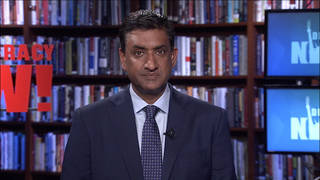
We speak with Robert Weissman of Public Citizen about Donald Trump’s various conflicts of interest after Trump hosted a private dinner at his Virginia golf club for the 220 top buyers of his $TRUMP cryptocurrency. The Trump family has also announced it is expanding its holdings in cryptocurrencies, with the Trump tech startup set to raise $2.5 billion to invest in bitcoin. “There’s millions of losers for every few winners in the crypto game. Trump is rigging the rules to make sure he’s on the winning side, but regular people are going to be hurt,” says Weissman, who was among protesters outside Trump’s crypto dinner. He adds that the Trump family’s crypto business is part of an “overall authoritarian mission” to reward the rich and powerful by skirting the rules while bringing the full weight of the government down on immigrants, protesters and other voices of dissent.
Transcript
AMY GOODMAN: Well, Rob, I want to go to another issue, about what’s being called “the Mount Everest of corruption,” how President Trump is personally profiting off the presidency through various crypto schemes. Last week, Trump hosted a private dinner at his Virginia golf club for the 220 top spenders on his $TRUMP memecoin. That’s one that has the dollar sign, then “Trump.” Altogether, the dinner attendees spent close to $400 million combined to gain access to Trump. I think it’s estimated it was about a $1 million-per-plate dinner.
This is Oregon Democratic Senator Jeff Merkley speaking at a protest outside.
SEN. JEFF MERKLEY: This is like the Mount Everest of corruption. Now, our founders were very worried about people buying influence with our country, because they knew you can’t have We the People government, if its government’s being sold to others.
AMY GOODMAN: This comes as the Trump family is continuing to expand its holdings in cryptocurrencies. On Tuesday, the parent company of Trump’s Truth Social platform announced plans to raise $2.5 billion to invest in bitcoin. The move could make the Trumps one of the largest corporate holders of bitcoin. So, Rob Weissman, if you can comment on all of this? You were outside that crypto dinner.
ROBERT WEISSMAN: Yeah, I was there with the senator. Today, JD Vance is going to be in Las Vegas talking to a crypto convention. The two Trump sons are going to be addressing that convention also. There is a swirl of money going around that has no precedent in all of American history. Trump and his family have estimated to have made $300 million or more dollars on crypto just in the first few months of the presidency. They’re likely to leave the four-year term having made billions cashing in on scams and fraud.
And it’s not just that it’s unethical. This corruption is part of an overall authoritarian mission. It is part of the non-prosecution system, where corporations are paying money, are sliding money to Trump through his crypto, to get excused from enforcement actions, including one of the biggest crypto holders in the country. It’s part of the authoritarian crackdown on immigration, where we see GEO Group, that you referenced before, trying to get money from the reconciliation bill we’re going to talk about in a second, which also previously employed Pam Bondi, the attorney general, as a consultant and lobbyist. There’s a combination of the corruption, the crackdown on undocumented people, the denial of speech and the massive giveaways to corporations that is all of a single story of this oligarchy and authoritarian move of the Trump administration.
JUAN GONZÁLEZ: And, Rob, there was a related issue in terms of the pardons that Trump has been issuing. The New York — the latest New York Times report shows that he pardoned a Paul Walczak, a nursing home executive who had pleaded guilty to tax crimes. And shortly after, Walczak’s mother attended a $1 million-per-person fundraising event at Trump’s Mar-a-Lago estate that promised face-to-face time with Trump. Here’s a guy who promised to drain the swamp and is actually putting the White House up for sale?
ROBERT WEISSMAN: It’s exactly what it seems. There’s a trucking company that bought some of the Trump meme. They didn’t buy enough, as it turned out, to get to the dinner, but they were explicit in their filings with the Securities and Exchange Commission that they were buying the currency to get access to the president to try to influence policy. That’s happening in broad daylight right now in Washington, D.C.
JUAN GONZÁLEZ: And in going back to this issue of the bitcoin, the reduced regulations on the bitcoin industry assure that all this money that’s being made, once Trump leaves office, very little of it will be able to be traced, isn’t it? That’s the big problem with bitcoin, that there’s no ability of any regulatory agency to follow where the money goes.
ROBERT WEISSMAN: Yeah, despite all the talk about how it’s going to transform the economy and rain wealth down on everybody, its single useful function has turned out to be for money laundering. And its other useful function is for scammers and grifters like the Trump family to manipulate markets, get rich. But when they’re getting rich, it is at the expense of losers. So, there’s millions of losers for every few winners in the crypto game. Trump is rigging the rules to make sure he’s on the winning side, but regular people are going to be hurt.
And as this system expands — and Congress is poised to let it expand right now — it’s really in danger of infecting the overall banking system. So, instead of being a small, weird grift that’s affecting millions of people, it may be something that actually introduces risk into the overall banking and financial system. And that itself is a product of all the money that crypto has spent on congressional races, including buying off some Democrats, who are now poised to vote for a bill legalizing some crypto operations that should not otherwise be legal.
AMY GOODMAN: You have in New York this developing story of two bitcoin bros arrested for kidnapping and torturing an Italian man in SoHo for weeks, holding him, torturing him to get his password. But I want to ask you, finally, about the budget, the GOP passing Trump’s sweeping budget bill that gives massive tax breaks to the rich while slashing spending for Medicaid, nutritional assistance, subsidies for clean energy, triggering massive cuts to Medicare. Rob, as we wrap up, how do you fit this into the level of the Mount Everest of corruption, what’s taking place? Now that bill is before the Senate.
ROBERT WEISSMAN: Right. So, this bill, if it moves forward, is going to be the biggest transfer of wealth in American history from regular people to the super rich. As you said, it’s going to be at the expense of clean energy, at the expense of giving billions of dollars to Pentagon contractors, including potentially Elon Musk, at the expense of billions of dollars for a police state immigration system, and at the expense of healthcare for millions of people. Why is it happening? It’s happening because of a corrupt political system where Republicans are trying to pay off their donors.
The most important thing for people to know about this, though, is it is not a done deal. There is a chance to stop this reconciliation package, this tax and budget package, from moving forward. Republicans are split among themselves about how to do it. And if there’s enough public pressure, this thing can be defeated. And it absolutely has to be defeated, because if it succeeds, it’s going to throw 14 million people off of healthcare, deny food assistance to millions more, and really make this country a less fair and just place, with painful consequences for many millions of Americans.
JUAN GONZÁLEZ: And, Rob, what do you advise, what does Public Citizen advise, as the — what Americans concerned about what is happening should be doing today?
ROBERT WEISSMAN: Well, this is not happening as fast as it may seem, the reconciliation thing, this tax and budget bill. It’s going to take months to get sorted out as the Republicans fight among themselves over tax breaks for whom or how vicious they want to be with their healthcare cuts. So there’s an opportunity for people to mobilize.
So, all the regular things of calling and emailing your members of Congress make a difference. And that’s true if you’ve got a Democratic member of Congress or a Republican member of Congress. There are going to be big national mobilizations around this. There’s going to be a big national mobilization under the banner of “No Kings” on June 14th. Those things, turning people out in the street, they’ve stopped the last effort in the first Trump administration to slash healthcare, and they can do it again this time. If we put enough people on the streets, put enough pressure on Congress, it will make a difference on this one.
AMY GOODMAN: June 14th is the day there will be a military parade in Washington, costing something like $20 million, President Trump’s 79th birthday?
ROBERT WEISSMAN: Same day.
AMY GOODMAN: That does it for our show. Rob Weissman, co-president of Public Citizen. Special thanks to Ariel Goodman. I’m Amy Goodman, with Juan González.













Media Options